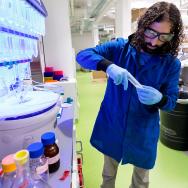The University of Chicago Medicine has launched a registry for individuals to participate in phase 3 trials for a vaccine to fight the virus that causes COVID-19.
Individuals may join UChicago Medicine’s registry to participate in these vaccine trials and in future COVID-19 prevention research.
The University of Chicago Medical Center was a testing site for Moderna’s vaccine. It will also be a testing site for the Janssen Pharmaceutical Companies of Johnson & Johnson’s Phase 3 clinical research study, ENSEMBLE trial, to evaluate the safety and efficacy of the Janssen’s investigational COVID-19 vaccine candidate, JNJ-78436735, also known as Ad26.COV2.S.
The Janseen trials are a Phase 3 randomized, double-blind, placebo-controlled clinical trial, which is designed to evaluate the safety and efficacy of a single vaccine dose of the Janssen COVID-19 vaccine candidate versus placebo. The entire study is planned to include approximately 60,000 adults 18 years old and older, including significant representation from those that are over 60.
UChicago Medicine will enroll up to 2,000 adults aged 18 and older from within the Chicago community. The study will include those both with and without comorbidities associated with an increased risk for severe COVID-19.
A cross-section of the community
UChicago Medicine’s participation in these large-scale national clinical trials is important because of the hospital’s location and connection to the South Side community. While thousands of potential volunteers already have signed up to be considered for vaccine trials in the Chicago area, researchers at UChicago hope to increase the representation of people of color and certain groups of at-risk patients, including the elderly and those with chronic diseases such as diabetes, hypertension, and heart disease.
“We know that African American and Hispanic patients are disproportionately affected by COVID-19, and we want to assure that persons of all races are represented in these important trials. We hope that members of the community surrounding the University of Chicago will volunteer to participate,” said David Pitrak, chief of the Section of Infectious Diseases at UChicago Medicine. “It’s very important to have adequate representation of all races and ethnicities in clinical trials to make sure that vaccines are as effective as possible for as many people as possible. And we really want to be able to offer vaccines to those who are at highest risk.”
These trials are part of large national trials that seek to enroll thousands of participants. Patients will be monitored following the injections to determine whether the vaccine can prevent symptomatic COVID-19. Participants will be tracked over the course of 27 months.
“The major question around this vaccine and all of the SARS-CoV-2 vaccines is not only whether the vaccine can induce an immune response but how durable is the immune response to the vaccine?” said Kathleen Mullane, director of infectious disease clinical trials at UChicago Medicine. “That’s why the studies will last over two years. We know that vaccines that make it to phase 3 trials can produce an immune response, but we don’t know how long that response will last or if patients will need annual booster shots, like they do with influenza.”
Habibul Ahsan, director of the Institute for Population and Precision Health at UChicago Medicine, noted that post-vaccination monitoring will include blood tests to determine antibody levels and antibody persistence over time, as well as weekly contact with volunteers to track whether participants get sick.
Those who experience COVID-19 symptoms will be rapidly tested for the virus. These data will help determine whether the vaccine protects against contracting the virus and whether vaccination can reduce the severity of symptoms if a person does become sick.
Seeking a broad volunteer base
As Operation Warp Speed aims to produce 300 million doses of an approved vaccine by January, it is critical for clinical trials to recruit and enroll participants of all ages and racial backgrounds. Without sufficient data reflecting minority and high-risk populations, researchers can’t be sure that a vaccine is effective and safe for all patients at risk of contracting the virus. UChicago Medicine plans to work with its already strong community base to ensure that enrollment in these important studies represents minority groups in the Chicago region.
Researchers will recruit participants in a hospital setting, as well as out into the community, in some cases using mobile medical units that will take the vaccine to people’s front doors. “We want to make this as easy as possible for volunteers to participate in these studies, and we want to be sure that the communities our hospital serves are well represented in this trial,” said Dr. Ahsan.
With promising safety and immune response data in hand from phase 1 and 2 trials for these vaccines, the researchers are eager to begin providing this resource to volunteers within the community.
“The volunteers in these trials are heroes,” said Mullane. “The data that come from these studies will inform healthcare forever. Enrollment in phase 3 trials is critical because these studies are much larger than the phase 1 and 2 trials and will provide us with so much more information regarding the effectiveness of the vaccine. We are really excited to be able to work with our communities to help to assure that people of all races have an equal opportunity to participate in these trials and are well represented.”
Researchers anticipate UChicago Medicine to be the site for additional COVID-19 vaccine trials in the months ahead. In the meantime, other clinical trials underway at UChicago Medicine are examining the effectiveness of treatments for COVID-19, including convalescent plasma, a neutralizing antibody, and remdesivir, a broad-spectrum antiviral medication.
Individuals who are interested in participating in the COVID-19 vaccine trials—including potential new vaccine candidates in future trials—may sign up for the UChicago Medicine COVID-19 Vaccine Registry at covidvaccinestudies.uchicago.edu.

